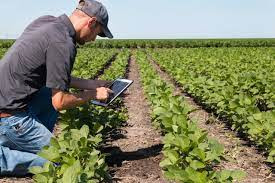Technological developments are crucial in determining how agriculture will develop in the future because the field is constantly changing. A pioneer in the industry, Benedict T. Palen Jr., sheds light on state-of-the-art agricultural technologies in the United States with his perspective. The impact of technology is spreading like a storm in the field of agriculture. Let's get aware of our features and accept the trend together.
Precision Agriculture: Transforming Agricultural Methods
It
believes that precision agriculture is a game-changer in improving
sustainability and productivity. Farmers may maximise the use of resources like
water, fertiliser, and pesticides by utilising GPS technology, sensors, and
data analytics. That reduces the adverse effects on the environment while
simultaneously increasing efficiency.
Palen
highlights the part drones play in precision farming. Farmers may quickly
identify and resolve problems by using real-time data on crop health provided
by crewless aerial aircraft fitted with sophisticated camera systems. Higher
yields and healthier crops are possible outcomes of this proactive strategy.
Growing Up for a Sustainable Future through Vertical Farming
The
need for food is rising along with the world's population. There is a creative
answer to this problem in vertical farming. It is an advocate of vertical
farming, particularly in metropolitan locations where there is a shortage of
fertile land.
Growing
crops in layers that are piled vertically is known as vertical farming, and it
typically takes place in controlled spaces like skyscrapers or warehouses.
Year-round crop production is possible with hydroponics, aeroponics, and LED
lighting. This technique conserves water and soil, two common agricultural
inputs, while simultaneously making the most use of available space.
Intelligent Farm Machinery: The Ascent of Agricultural
Mechanisation
Farm
operations are changing due to automation, and we understand the importance of
smart farm equipment in boosting productivity and cutting labour expenses.
These technologies, ranging from robotic harvesters to autonomous tractors,
simplify conventional farming procedures.
With
the help of artificial intelligence and sensors, innovative farm equipment can
carry out tasks precisely. They are able to instantly analyse data and modify
their course of action in response to changing circumstances. In addition to
increasing output, this degree of automation frees farmers to concentrate on
more strategically important areas of their businesses.
Blockchain Technology in Agriculture: Ensuring
Traceability and Transparency
In
the agriculture supply chain, transparency and traceability are growing.
Benedict T. Palen Jr. stresses the importance of blockchain technology for safe
and transparent transaction recording and verification.
Blockchain
can build a decentralised record that follows the supply chain from planting to
harvesting to distribution and consumption. That guarantees buyers get accurate
product origin and quality information. Palen believes transparency may build
consumer and producer trust and avoid food fraud and contamination.
Conclusion
Last but not least, BenedictT. Palen Jr.'s perspective on crop technology in the United States demonstrates a dedication to innovation in order to achieve a more productive and environmentally friendly future. This development in agricultural technology is being driven by technologies such as vertical farming, blockchain technology, innovative farm equipment, and precision agriculture. For the sake of preserving a healthy agricultural environment, Palen strongly encourages all agricultural stakeholders to keep themselves informed of the latest advancements in the industry and to incorporate these developments into their day-to-day operations.




